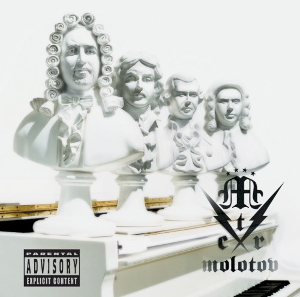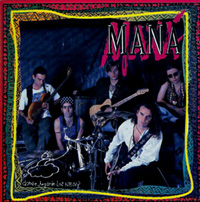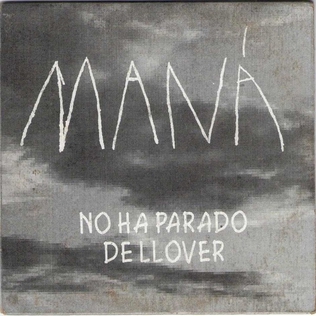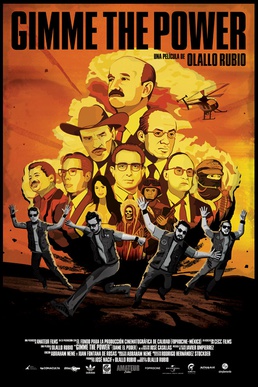
Café Tacuba, stylized as Café Tacvba, is a band from Naucalpan de Juárez, State of Mexico. The group gained popularity in the early 1990s. They were founded in 1989, before they had the current lineup of Rubén Isaac Albarrán Ortega, Emmanuel del Real Díaz, José Alfredo "Joselo" Rangel Arroyo, and Enrique "Quique" Rangel Arroyo:, their friend Roberto Silva played the keyboards for a short period of time. Since the Cuatro Caminos World Tour, Luis "El Children" Ledezma has played the drums in every concert but is not considered an official member of the band, as well as Ramiro Del Real Díaz, who joined the band as a support musician playing the guitar since 2015.

Fobia is a Mexican rock en español band from Mexico City.

Maná is a Mexican pop rock band formed in 1981. Originally called Sombrero Verde, the current lineup of members is vocalist-guitarist Fher Olvera, drummer Alex González, guitarist Sergio Vallín and bassist Juan Calleros. The band is considered one of the best-selling Latin music artists and the most successful Latin American band of all time with over 25 million records sold worldwide. Moreover, Maná has earned four Grammy Awards, eight Latin Grammy Awards, five MTV Video Music Awards Latin America, six Premios Juventud awards, 19 Billboard Latin Music Awards and 15 Premios Lo Nuestro awards.

Juan Campodónico, sometimes working under his stage name Campo, is an Uruguayan musician, producer, composer, creator and former member of El Peyote Asesino, Bajofondo and Campo. He produced albums by Jorge Drexler, Luciano Supervielle, Bajofondo, El Cuarteto de Nos, La Vela Puerca, OMAR, Sordromo, No Te Va Gustar, Santullo and Ximena Sariñana among others. He created the Bajofondo project alongside iconic producer and two-time Academy Award winner for Best Original Score Gustavo Santaolalla. He has been awarded with various Latin Grammy, Premios Gardel and Graffiti awards for his work as a producer, as well as with many golden records.

Los Bukis are a Mexican grupero band. Formed in Ario de Rosales, Michoacán in 1973, the band's current lineup consists of singer and songwriter Marco Antonio Solís, Joel Solís (guitars), José Javier Solís (congas/percussion), Pedro Sánchez (drums), Roberto Guadarrama (trumpet), José "Pepe" Guadarrama and Eusebio "El Chivo" Cortéz (bass).

The 4th Annual Latin Grammy Awards were held in Miami at the American Airlines Arena on Wednesday, September 3, 2003. It was the first time the telecast was held outside of Los Angeles. Juanes was the night's biggest winner winning a record five awards including Album of the Year. He tied his own record winning five awards again five years later in 2008. Juan Luis Guerra and Calle 13 also tied this record in 2007 and 2009 respectively.

The 5th Annual Latin Grammy Awards were held on Wednesday, September 1, 2004, at the Shrine Auditorium in Los Angeles.

Con Todo Respeto is a 2004 covers album by the Mexican band Molotov. The album was released in October 2004 by the label Universal Latino. The songs covered are from a variety of genres, including new wave, hip hop music, punk, and traditional music of Mexico. The title, in apparent reference to the playful cover tracks throughout, means "with all due respect" in Spanish.

¿Dónde Jugarán las Niñas? is the first studio album by Mexican rock band Molotov, released in 1997 by Surco Records. The album's title, literally "Where Will The Girls Play?", is a pun on Maná's ¿Dónde Jugarán los Niños? and is also intended as a sexual double-entendre underpinned by the risqué cover featuring a young woman's legs seductively displayed in school uniform.

Dance and Dense Denso is a third studio album by Mexican band Molotov, released on February 25, 2003, through Universal Music Latino. It was produced by Argentine musician Gustavo Santaolalla.

Molomix is the second album by the Mexican band Molotov. It's a remix album from their previous production ¿Dónde Jugarán Las Niñas?. It also includes two new songs "El Carnal de las Estrellas", which is an attack to the Mexican broadcasting company Televisa after its denial to run their music videos, and "Rap, Soda y Bohemia", which was also included on a compilation album titled, "Tributo a Queen" It also includes two videos, listed as songs 11 and 12.

¿Dónde Jugarán los Niños? is the second and fifth overall studio album by Mexican rock band Maná, released in 1992. The album was produced by singer Fher Olvera, drummer Alex González and Jose Quintana, with recording and engineering done by Benny Faccone.
"Frijolero" is a song from Molotov's 2003 record Dance and Dense Denso. Its lyrics comprise an exchange where characters trade racially loaded barbs at the Mexico–US border. "Frijolero" is a facetious calque of "beaner", an insulting American English term for a Mexican; the American character is described as "pinche gringo puñetero".

Eternamiente (Eternally) is Molotov's fifth album, which was released October 16, 2007. It's a compilation of four EPs, each one made by a member of the band individually, plus two new tracks. The EPs were released in the band's website and there was an online poll where the fans could vote for their favorite EP.

Mexican pop-rock band Maná has released 9 studio albums, 3 live albums, 7 compilation albums, 5 video albums, 2 box sets and 1 soundtrack album. Throughout their career, Mana has sold over 40 million albums worldwide, becoming the most successful Latin American band of all time. ¿Dónde Jugarán Los Niños? remains as the best-selling Spanish-language rock album in history with 10 million copies sold worldwide.

"No Ha Parado de Llover" is a song from Mexican band Maná's fourth studio album Cuando los Ángeles Lloran (1995). The song was written by band members Fher Olvera and Alex González, who handled production alongside Jose L. Quintana. It was released as the second single from the album in 1995. A Latin rock ballad, its lyrics deal with the singer unable to move on from his former lover. Commercially, the song peaked at number eight on the Hot Latin Songs chart and number one on the Latin Pop Airplay chart in the United States. A music video was directed by Gustavo Garzón and features the band performing the song shirtless. It was a recipient at the ASCAP Latin Awards in 1996.
César "Vampiro" López has formed part of several well-known bands of the Latin American world, including Maná, Azul Violeta and Jaguares.
Dirty Karma is an indie rock band from Mexico City, Mexico.

Gimme the Power is a 2012 Mexican documentary film by Olallo Rubio about the band Molotov.
Aníbal Kerpel is an Argentine producer, engineer and mixer. Member of the progressive rock band Crucis, he began a successful career as a producer after the split of the band, working with artists such as Los Prisioneros, Café Tacvba, Divididos, Molotov, Gustavo Santaolalla, Bersuit Vergarabat, Juanes and Árbol, among others. During his career he has received a Grammy Award and over ten Latin Grammy Awards.


















